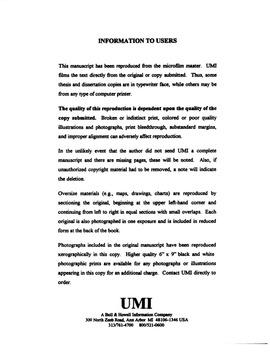| dc.contributor.advisor | Miller, Raymond B., | en_US |
| dc.contributor.author | Brickman, Stephanie J. Young. | en_US |
| dc.date.accessioned | 2013-08-16T12:30:16Z | |
| dc.date.available | 2013-08-16T12:30:16Z | |
| dc.date.issued | 1998 | en_US |
| dc.identifier.uri | https://hdl.handle.net/11244/5696 | |
| dc.description.abstract | The research reported here was guided by a theoretical model developed by Miller and Brickman (1997). The model depicts future goals and the plans to reach them as impacting self-regulation for present achievement. To investigate the knowledge upon which plans for the future develop case study methods were used. The participants were ninth grade students attending an alternative school, one Mexican female, one Cheyenne-Arapaho male and one Caucasian female. Data sources included: interviews, historical data, autobiographical reports, surveys tapping students' present classroom goals, cognitive engagement and self-regulation (Miller, et al., 1996), and repeated observations. These data supported that knowledge about the future is represented as plans and that much of this knowledge was the result of sociocultural experiences. Also contributing to the development of plans were the students' school experiences. All three students' plans consisted of relationships between the students' past, present and reported future goals. As predicted by the model, plans were found related to achievement through perceived instrumentality. Students' present level of achievement and self-reported regulation were consistent with the types of present goals they reported on surveys, which were consistent with what they reported in interviews as instrumentally related to reaching their future goals. Finally, the results of a cross-case analysis supported Miller and Brickman's (1997) model. In all three cases these data revealed that future goals provided incentive value through the generation of a plan of subgoals, and influenced self-regulation of academic behaviors toward their future through the perceived instrumentality of the present task. | en_US |
| dc.format.extent | xiv, 367 leaves : | en_US |
| dc.subject | Action theory. | en_US |
| dc.subject | Goal (Psychology) | en_US |
| dc.subject | Education, Educational Psychology. | en_US |
| dc.title | How perceptions of the future influence achievement motivation. | en_US |
| dc.type | Thesis | en_US |
| dc.thesis.degree | Ph.D. | en_US |
| dc.thesis.degreeDiscipline | Department of Educational Psychology | en_US |
| dc.note | Chairman: Raymond B. Miller. | en_US |
| dc.note | Source: Dissertation Abstracts International, Volume: 59-09, Section: A, page: 3344. | en_US |
| ou.identifier | (UMI)AAI9905612 | en_US |
| ou.group | Jeannine Rainbolt College of Education::Department of Educational Psychology | |
